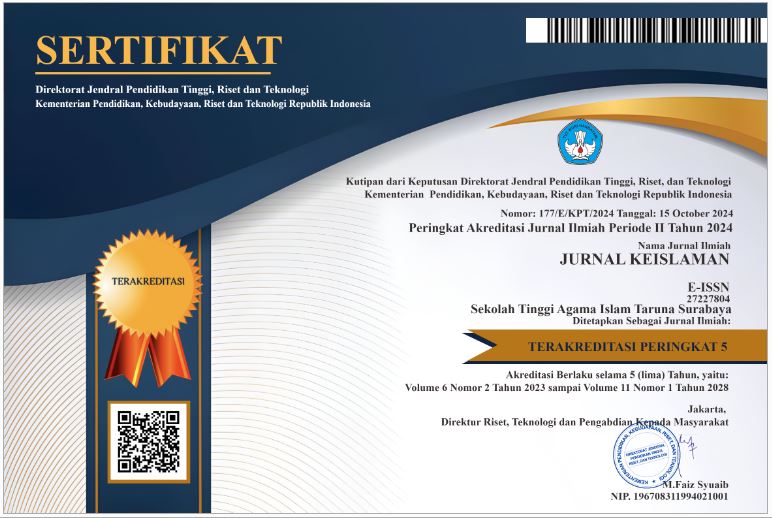Analisis Metode Pendidikan Islam dalam Al-Qur'an: Kajian QS. Hud Ayat 61-68
DOI:
https://doi.org/10.54298/jk.v7i2.268Keywords:
Method, Islamic Education, QS. Hud: 61-68Abstract
The aim of this research is to explore the Islamic educational methods contained in Surah Hud, verses 61-68. Current phenomena indicate that there are still many errors in teaching methods, both within and outside of school environments. One notable issue is that teachers often hesitate to administer punishment to students due to concerns about being perceived as engaging in violence. Therefore, this study seeks to revisit appropriate educational methods based on the guidance of the Qur'an. This research is a qualitative library research using content analysis as the analysis method. Focus of this research is on Surah Hud, verses 61-68, which is analyzed based on the interpretations of Tafsir Al-Azhar by Buya Hamka, Tafsir An-Nur by Teungku Hasbi Ash-Shidiqi, and Tafsir Al-Misbah by Quraish Shihab. The findings reveal that there are five Islamic educational methods in Surah Hud, verses 61-68, namely: a) the lecture method, b) the question and answer method, c) the demonstration method, d) the assignment method, and e) the Targhib (reward) and Tarhib (punishment) method. These methods can serve as a model that can be applied in contemporary education. Their relevance remains strong today, although their application may require adjustments and modifications in line with modern developments.
Downloads
References
An-Nahlawi, Abdurrohman. Prinsip-Prinsip dan Metode Pendidikan Islam. Bandung: Diponegoro, 2015.
Arifin, Zaenal. “Metode Pembelajaran Pendidikan Agama Islam Di Masa Pandemi COVID 19.” SALAM: Jurnal Sosial dan Budaya Syar-i 8, no. 6 (6 November 2021): 2025–38. https://doi.org/10.15408/sjsbs.v8i5.22518.
Ash Shiddieqy, M. Hasbi. Tafsir al-Qur’anul Majid an-Nuur. Cet. 2., ed. 2. Semarang: Pustaka Rizki Putra, 2000.
Bisri, Khasan. Metode Pendidikan dalam Perspektif Al- Quran dan Relevansinya dengan Pendidikan Islam. Bandung: NUSAMEDIA, 2021.
Daradjat, dkk. Ilmu Pendidikan Islam. Jakarta: Bumi Aksara, 2011.
Djalal, Fauza. “Optimalisasi Pembelajaran Melalui Pendekatan, Strategi, dan Model Pembelajaran,” t.t.
Fadriati, Fadriati. “PRINSIP-PRINSIP METODE PENDIDIKAN ISLAM DALAM ALQURAN.” Ta’dib 15, no. 1 (28 September 2016). https://doi.org/10.31958/jt.v15i1.220.
Festiawan, Rifqi. “Belajar dan Pendekatan Pembelajaran,” t.t.
Fikri, Mumtazul. “KONSEP PENDIDIKAN ISLAM; Pendekatan Metode Pengajaran.” Jurnal Ilmiah Islam Futura 11, no. 1 (3 Februari 2017): 116. https://doi.org/10.22373/jiif.v11i1.66.
Firmansyah. Mentoring Agama Islam Alternatif Strategi Pembelajaran Pendidikan Agama Islam di Sekolah dan Perguruan Tinggi Umum. Solok: Mitra Cendekia Media, 2022.
Hamka. Tafsir Al-Azhar. Singapura: Pustaka Nasional PTE LTD, t.th.
Hanbal, Ahmad bin. Musnad Ahmad bin Hanbal. Vol. Jilid IV, t.th.
Kusnadi. Metode Pembelajaran Kolaboratif. Jawa Barat: Universitas Tasikmalaya, 2018.
M. Pd I., Rahmat. Metode Pembelajaran Pendidikan Agama Islam Konteks Kurikulum 2013. I. Yogyakarta: Bening Pustaka, 2019.
Mahmudah, Mila. “Mengembangkan Profesionalisme Guru Pendidikan Agama Islam (PAI) Melalui Model-Model Pembelajaran.” Jurnal Keislaman 4, no. 1 (10 Maret 2021): 19–31. https://doi.org/10.54298/jk.v4i1.3269.
Qowim, Agus Nur. “Metode Pendidikan Islam Perspektif Al-Qur’an.” IQ (Ilmu Al-qur’an): Jurnal Pendidikan Islam 3, no. 01 (31 Juli 2020): 35–58. https://doi.org/10.37542/iq.v3i01.53.
Restian, Arina. Pengantar Pendidikan. Cet. II. Malang: Universitas Muhammadiyah Malang, 2019.
Rianie, Nurjannah. “PENDEKATAN DAN METODE PENDIDIKAN ISLAM (Sebuah Perbandingan dalam Konsep Teori Pendidikan Islam,” t.t.
Sagara, Syaiful. Konsep dan Makna Pembelajaran. Cet. IX. Bandung: Alafabeta, 2011.
Shihab, M. Quraish. Tafsir Al-Mishbah Pesan, Kesan dan Keserasian al-Qur’an. Vol. Jilid ke IV. Jakarta: Lentera Hati, t.t.
Syaripudin, Ahmad, Abas Asyafah, dan Udin Supriadi. “KONSEP PENDIDIKAN PADA KISAH NABI KHIDIR AS DENGAN NABI MUSA AS DALAM ALQURAN DAN IMPLIKASINYA TERHADAP KONSEP PENDIDIKAN ISLAM.” TARBAWY : Indonesian Journal of Islamic Education 5, no. 2 (16 April 2019): 137. https://doi.org/10.17509/t.v5i2.16750.
Taufik, Mokhamad. “Hakikat Metode, Materi dan Alat Dalam Pendidikan Islam (Implementasi Model Pembelajaran ‘Market Place Activity’ Dalam Meningkatkan Motivasi Belajar PAI Siswa SMK Negeri 2 Samarinda)” 6, no. 12 (2023).
Za, Tabrani. “MENELUSURI METODE PENDIDIKAN DALAM AL-QUR`AN DENGAN PENDEKATAN TAFSIR MAUDHU`I” 2, no. 01 (2014).
Zahroh, Lailatu. “ANALISIS TERHADAP PEMIKIRAN HAMKA DAN MUHAMMAD IQBAL TENTANG TUJUAN PENDIDIKAN.” Jurnal Keislaman 2, no. 1 (1 November 2021): 56–80. https://doi.org/10.54298/jk.v2i1.3375.
Downloads
Published
How to Cite
Issue
Section
License
Copyright (c) 2024 Rengga Irfan, Syafiyatul Khuluqi

This work is licensed under a Creative Commons Attribution-ShareAlike 4.0 International License.
Authors who publish with this journal agree to the following terms:
- Authors retain copyright and grant the journal right of first publication with the work simultaneously licensed under a Creative Commons Attribution-ShareAlike 4.0 that allows others to share the work with an acknowledgement of the work's authorship and initial publication in this journal.
- Authors are able to enter into separate, additional contractual arrangements for the non-exclusive distribution of the journal's published version of the work (e.g., post it to an institutional repository or publish it in a book), with an acknowledgement of its initial publication in this journal.
- Authors are permitted and encouraged to post their work online (e.g., in institutional repositories or on their website) prior to and during the submission process, as it can lead to productive exchanges, as well as earlier and greater citation of published work (See The Effect of Open Access).


















